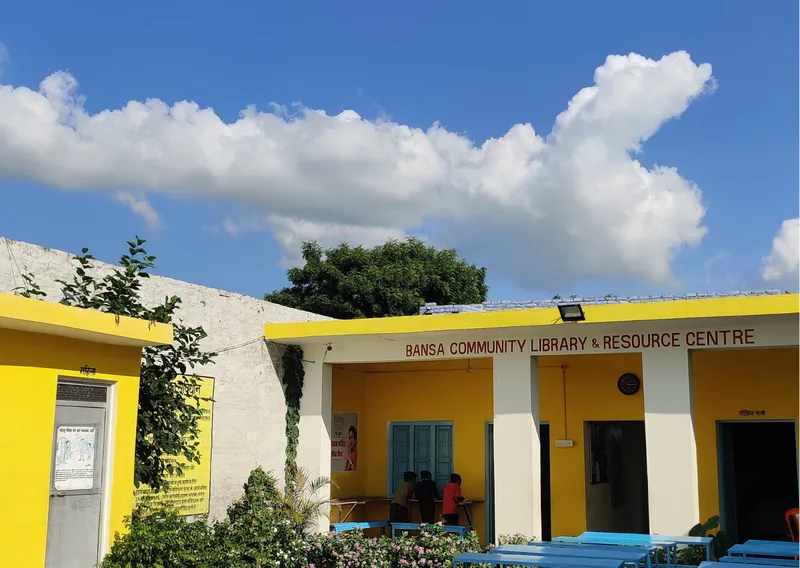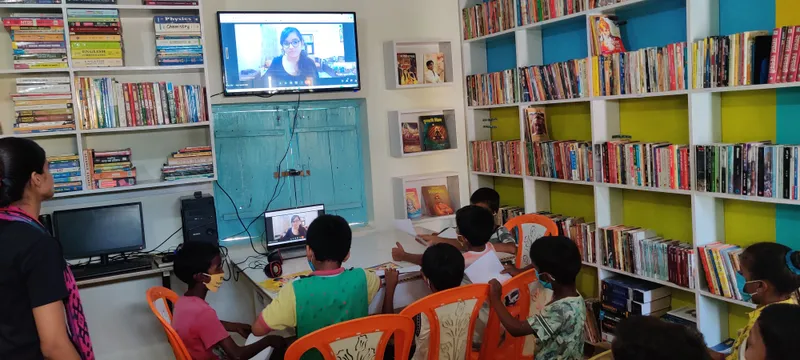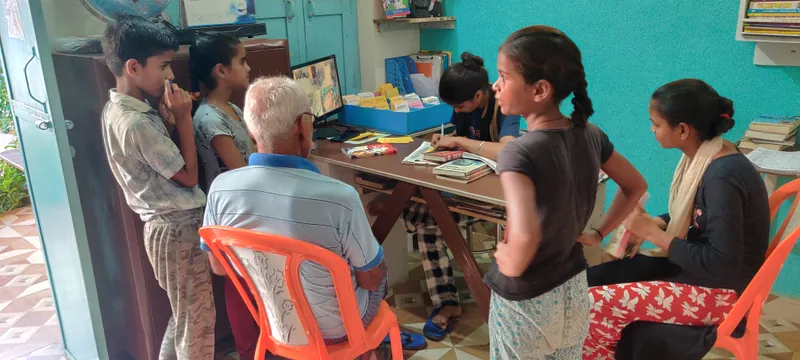How this law graduate built Hardoi’s first community library
The library hopes to inculcate a strong reading habit in the children of the village and support youngsters preparing for competitive exams.
In Bansa village in the Hardoi district of Uttar Pradesh, most senior secondary students are sent to nearby cities of Kanpur or Allahabad to prepare for competitive examinations, in the hopes that they will secure a government job.
When the lockdown was implemented last year, many students had to return home to the village. Recognising that these aspirants needed a place to get coaching, was one of the primary motivators behind the opening of Bansa Community Library. “The other objective was to create a reading culture in the village,” founder Jatin Lalit Singh tells SocialStory.

“Bansa is my birth village where I lived for 16 years before moving to Lucknow and then Delhi for college,” says Jatin. He hails from a family of educationists; his grandfather started the first all-girls school in the area. “I grew up seeing him read and saw the impact that reading had on him,” Jatin says.
In 2016, as a student at Galgotias University, Jatin joined an initiative called The Community Library Project (TCLP) as a volunteer and got so involved that he stayed on for three years. “In the initial days of my volunteering, I used to just dust books and arrange them in the shelves and then gradually I got involved in core work such as developing curriculum and organising events,” he recalls.
He realised how a TCLP library can have a direct impact on people’s lives when a young boy named Daksh, who was very hesitant and shy at first, joined the library. “In 2020, when I left, Daksh was fluent English reader, he used to interact [with everyone], there was change and development in his personality,” Jatin shares. He wanted the same opportunities for the children of his village as well.
The work for building Bansa Community Library started in September 2020 and was opened to the public in December that year. The land was leased by a temple and all the money needed for growing the initiative was raised through crowdfunding.
All the books have been donated by people while the books used for competitive exam preparations have been sourced through Amazon Wishlists being shared in various networks. “We got children’s books from TCLP; and Pratham Books and some Hindi books from Rajkot Library, which was closing at the time,” Jatin explains.
A library without fines
Currently, 118 students are preparing for various competitive exams at the library. All the services are provided free of charge. Jatin says that they had initially considered a paid membership model but decided against it as there is a high level of unemployment and he found that many children have to work to survive.
Even a membership fee as small as one rupee could act as a barrier that would prevent some children from accessing the library. “That’s why we don’t even have the concept of late fines,” Jatin says.
The cost of operations for the library is nearly Rs 10,000 which is covered by monthly patrons. Patrons are part of the library’s growing network of wellwishers, many of whom learned about the initiative via social media.
“We also know of resources in cities or online and we know of people who can use them so we connect them,” he says. Several organisations have been running classes for underprivileged children online so the library creates a schedule and provides access to the children of the village.

According to Jatin, the urban-rural divide has been among their primary challenges, with the village not having electricity for five to six days at a stretch sometimes, and the classes also get stalled as often they are unable to connect to the teachers and volunteers.
At the peak of the pandemic, the library also had to stop in-person operations and pivoted to delivering books directly to readers.
A stepping stone to success
Most competitive exams have the same core subjects so the library has decided to hold classes for these together. English is taught to the children by a volunteer from Pune. There are seven students currently preparing for the Central Teacher Eligibility Test (CTET) who access virtual lessons through apps at the library. There are a total of nine volunteers who take classes for different subjects every week.

Some students are also enrolled in Project Kaksha, which is a legal literacy programme run by Rajiv Gandhi National University’s Legal Aid Clinic. In this way, the children of Bansa now have the opportunity to explore various avenues more conveniently.
To date, the Bansa Community Library receives 80-90 daily visitors, out of which nearly 65 percent are women. From read-aloud sessions that happen a few times a week to offer a place of solitude for older readers, the library has proven to be a source of growth for the community. Although they are the first in Hardoi, they hope to inspire more such initiatives and impact more lives through their operations.
YourStory’s flagship startup-tech and leadership conference will return virtually for its 13th edition on October 25-30, 2021. Sign up for updates on TechSparks or to express your interest in partnerships and speaker opportunities here.
For more on TechSparks 2021, click here.
Edited by Kanishk Singh



![[Sustainability Agenda] This innovative startup wants you to pick seed crackers over firecrackers this Diwali](https://images.yourstory.com/cs/5/54bfb360112e11ecbdb4b127003811f4/CopyofImageTagsEditorialTeamMaster4-1634134981426.jpg?fm=png&auto=format&h=100&w=100&crop=entropy&fit=crop)




